GALLUP NEWS SERVICE
During recent days and weeks, the stock market has shown an incredible amount of volatility. Some on Wall Street say the market and the economy are approaching a key turning point; others say the market may be close to forming a bottom. All of this may be of importance to day traders, but the real question for the future of most Americans is where the stock market and the economy will be six months from now.
In his testimony to Congress this week, Federal Reserve Board Chairman Alan Greenspan said that, "… absent significant further adverse shocks, the U.S. economy is poised to resume a pattern of sustainable growth." That may be the case. And, it is consistent with what Americans have been telling Gallup during the first half of this year. But, it is not what the public is currently thinking.
New Gallup Poll economic data (July 9-11) show that more Americans think the stock market will go down over the next six months than think it will go up -- almost a complete reversal of the public's thinking since October of last year. Not surprisingly, more Americans also tell Gallup that the economy is getting worse than say it is getting better -- another major reversal of expectations for most of 2002.
The fact is, perceptions of the stock market have a significant impact on how people perceive the economy's future. A Gallup poll last month found that two out of three Americans say they feel less confident about the economy because of the recent changes in the stock market.
Of course, one of the key reasons why many Americans are less optimistic about both the future of the stock market and the economy is the perception that the scandals on Wall Street are widespread. According to another Gallup poll conducted earlier this month, two out of three Americans believe that the following are somewhat or very widespread:
- Stockbrokers tell investors what is best for the broker not the investor.
- Top corporate executives take improper actions to help themselves at the expense of the company.
- Financial audits of large corporations hide damaging information about the company.
Might it be that the current corporate scandals represent another, in Greenspan's words, "significant adverse shock" to the economy? A shock that still is not fully appreciated, nor reflected, in today's economic data. Gallup's attitudinal data suggest there has been a significant change in public perceptions in July. Whether this change qualifies as a significant shock from an economic perspective is still to be determined.
Stock Market Expectations Have Turned Negative
In October 2001, 46% of the public expected the stock market to go up over the next six months and 30% expected it to go down. For many of the months to follow, those saying the market would go up proved to be right. And since that time, somewhere between 42% and 56% of Americans continued to say they expected the stock market to go up. Public expectations for the stock market did an almost complete reversal in July with only 29% of the public saying the stock market will increase over the next six months and 43% saying it will decrease.
More men (34%) than women (25%) say the market will increase over the next six months. There is no substantial difference in opinion among Americans of different ages. But those with incomes of $50,000 or more are more likely than other Americans to say the market will go up (35%). So are those who have a college degree (36%), and those who have done post-graduate work (40%).
| In the Next Six Months: Will the Stock Market Go Up or Down? |
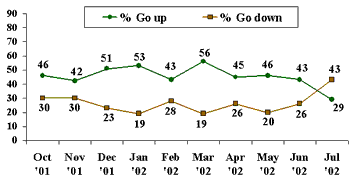 |
And, More Expect Unemployment to Increase
In October 2001, 51% of Americans said that they expected unemployment to increase over the next six months while 33% said they expected it to decrease. Once again, the majority of Americans were right as unemployment steadily increased. In July, 47% of the public still says it expects unemployment to increase in the months ahead. Not a sign that many Americans see the unemployment situation improving, but still below the level of concern shown last October.
| In the Next Six Months: Will Unemployment Go Up or Down? |
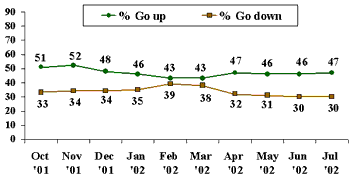 |
More Americans Also Expect Inflation to Increase
In October 2001, 45% of Americans said that they expected inflation to increase over the next six months while 18% said they expected it to decrease. In this instance, the majority was wrong as inflation continues to be a non-problem. In July, 55% of Americans say they expect inflation to increase over the next six months. This may simply reflect the feeling that inflation cannot remain low forever, or perhaps some Americans are worried about the dollar's weakness.
| In the Next Six Months: Will Inflation Go Up or Down? |
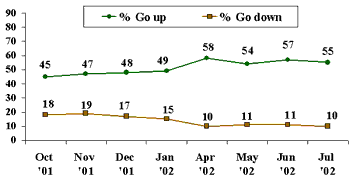 |
But, Less Americans Expect Interest Rates to Increase
In October 2001, 25% of Americans said that they expected interest rates to increase over the next six months while 44% said they expected them to decrease. Once again, the majority was right as interest rates decreased. By April, 59% of Americans said they expected interest rates to increase and only 14% said they expected rates to decrease. In June, 54% of the public still said it expected interest rates to increase and only 12% expected rates to decrease. By July, however, a smaller 40% say they expect interest rates to increase and 19% expect rates to decrease. This may simply reflect the feeling that interest rates cannot remain low forever, or maybe some Americans are worried about the impact of a weak U.S. dollar on interest costs. Still, the fact that many fewer Americans expect rates to increase is consistent with expectations that there will be slower-than-expected economic growth.
| In the Next Six Months: Will Interest Rates Go Up or Down? |
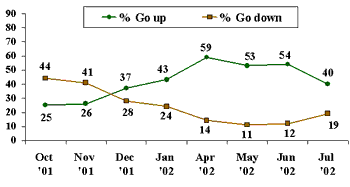 |
And, Less Expect Growth to Increase
In October 2001, 37% of Americans said that they expected economic growth to increase over the next six months while 32% said they expected it to decrease. Again, the majority was right as economic growth increased, particularly during the first quarter of this year. By March, 61% said they expected growth to increase and only 18% expected it to decrease. Still, in July, only 44% of Americans expect economic growth to increase over the next six months. This is better than expectations for growth late last year, and not a sign that many Americans see a double-dip recession, but still well below the levels of optimism just a few months ago.
| In the Next Six Months: Will Economic Growth Go Up or Down? |
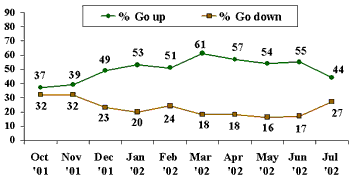 |
Survey Methods
Results are based on a randomly selected national sample of 1,004 adults, aged 18 and older, conducted July 9-11, 2002. For results based on this sample, one can say with 95% confidence that the maximum error attributable to sampling and other random effects is ±3%. In addition to sampling error, question wording and practical difficulties in conducting surveys can introduce error or bias into the findings of public opinion polls.

